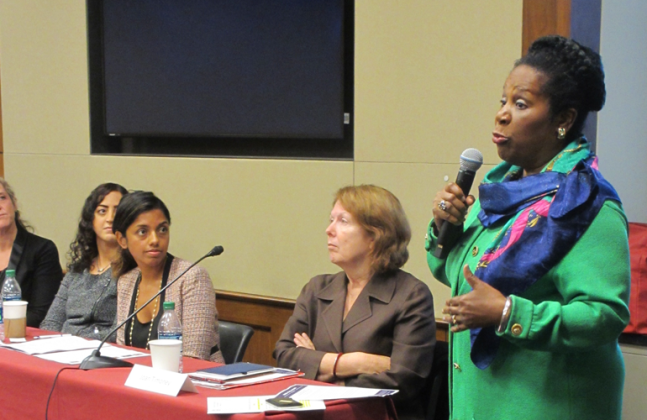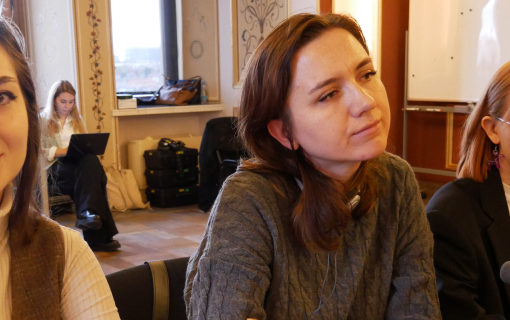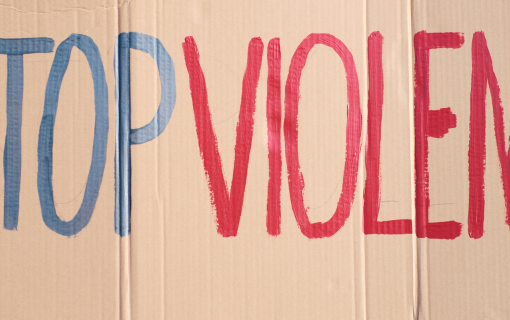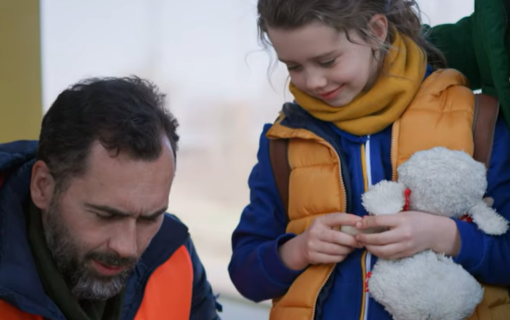
Beyond the Headlines: The Movement of Women and Girls in Conflict
On November 19, 2015, the International Foundation for Electoral Systems (IFES) and the Office of Congresswoman Sheila Jackson Lee (TX-18) hosted “Beyond the Headlines: The Movement of Women and Girls in Conflict,” the third installment of the “Women, Peace and Security” Capitol Hill breakfast briefing series.
Having just returned from a trip to the Syrian-Turkish border, Jessica Huber, IFES Senior Gender Specialist, spoke of her experiences there and the timeliness of the day’s discussion. She then introduced panelists Joan Timoney, Senior Director of Advocacy and External Relations at the Women’s Refugee Commission; Shilpa Nadhan, Senior Program Specialist at the International Organization for Migration; Reem Khamis, Protection/Gender Based Violence Technical Advisor at the American Refugee Committee; and Elizabeth Pender, Humanitarian Gender Based Violence/Protection Advisor for the U.S. Agency for International Development’s (USAID) Office of Foreign Disaster Assistance.
Timoney launched the conversation with an overview of the current global displacement situation, in which over 100 million individuals are in need of humanitarian aid and assistance. Of these, more than 60 million have been displaced by conflict in places like Syria, Iraq, South Sudan, Burundi, Yemen and Central America. Compounding the situation is “the protracted nature of displacement,” the average length of which is now 17 to 20 years, and the difficulties refugees have in finding legal employment. Timoney then explained how the United Nations Security Council Resolution (UNSCR) 1325 provides a four-point framework for responding to the particular needs of women and girl refugees and internally displaced persons (IDPs) through their participation in all levels of decision-making on peace and security issues; protection from harm, discrimination and abuse; the role of women in conflict prevention strategies; and addressing the specific needs of women and children in relief and recovery efforts.
Nadhan’s organization, the International Organization for Migration, extends assistance to refugees, economic migrants, IDPs and migrants caught within a third country in conflict, such as Filipina workers left behind in Syria. She has found an increase in the feminization of migration to Europe, with women and girls who had initially been left behind now more likely to make the journey themselves.
In sharing stories of three women living in IDP camps in northern Syria, Khamis illustrated specific realities and vulnerabilities for women in the midst of conflict. Even before the current conflict, one in three Syrian women experienced domestic violence at some point in their lives. While that has continued, Khamis explained how women, and even their children, are also subjected to sexual violence at the hands of other family members, extremist groups and government authorities. Additionally, the conflict has made women the de facto breadwinners for their families as they continue to maintain all household responsibilities, all while constantly on the move to avoid violence. Despite such challenges, Khamis found in them a “common resilience, patience, and will to survive.”
Pender then expanded the scope of the discussion and reminded audience members that what is happening in Syria “is not unique [and] illustrative of a much bigger problem.” She has found that people often have a “tendency to get caught in the tyranny of the urgent” and experienced the same issues in Sierra Leone, Darfur, Burma, Pakistan, Libya, Côte d’Ivoire, Nigeria and Lebanon. In her current position at USAID, she is encouraged by the fact that the protection sector is the only one with policy attached to it, increasing accountability for their work.
The panel then fielded questions from the audience, which covered the roles of traditional power dynamics and gender advisers, the value of both quantitative and qualitative data and the current rhetoric surrounding refugees and national security concerns. In responding to a question about women’s leadership trainings, Huber pointed to how IFES’ long-term presence in some countries helps ensure women’s participation, as there is “no end point to conflict or starting point for sustainable democracy.”
This portion was then followed by remarks from IFES President and CEO Bill Sweeney and Congresswoman Jackson Lee. Sweeney highlighted the difficulties of the resettlement process in the U.S. and called on audience members to pull men like himself into the conversation. Congresswoman Jackson Lee closed the event by calling on her fellow members of Congress and the American people at-large to embrace and protect women and girls and “continue to be the humanitarian arm and face of the world.”
IFES’ next “Women, Peace and Security” briefing on “Women in the Military” will be held on Thursday, January 21, 2016. To RSVP, please contact Liz Sidell at esidell@ifes.org.









